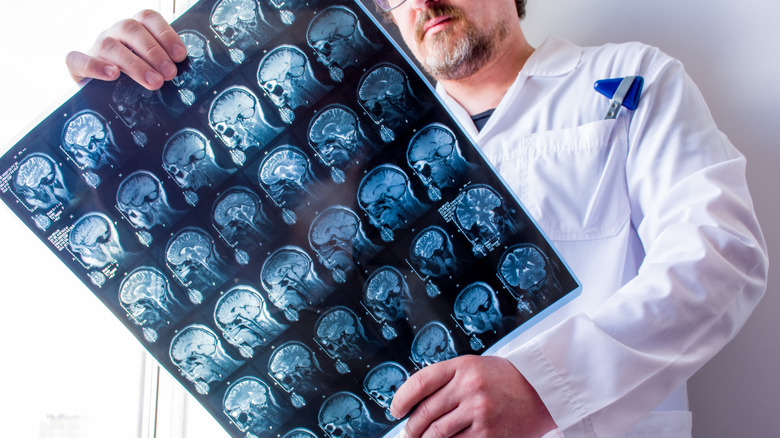This Is What Really Causes Epilepsy
The brain may seem like a mysterious organ, a complex web of connections that keep us functioning and alive. When it's not working properly due to illness or other medical conditions, it can be confusing and alarming. Epilepsy is sometimes considered to be one of those conditions.
It's estimated that 2.2 million people in the U.S. suffer from epilepsy, or approximately 7 out of every 1,000 Americans (via Epilepsy Foundation). Furthermore, 1 in 26 people will develop epilepsy at some point in their lives. It's the fourth most common neurological condition, behind migraine, stroke, and Alzheimer's disease.
Epilepsy is a brain disorder that most typically causes seizures, according to the American Academy of Neurological Surgeons. In people with epilepsy, the normal electrical patterns of the brain become interrupted and imbalanced, affecting consciousness, movement, or sensation. Sudden bursts of electrical energy in the brain causes seizures, which result in abrupt changes in behavior. If you've had 2 seizures that weren't caused by other conditions, such as alcohol withdrawal or low blood sugar, you may be diagnosed with epilepsy. A doctor will make a diagnosis based on tests such as MRIs or CAT scans, as well as physical symptoms.
Epilepsy could be due to a number of causes
What causes this strange neurological activity? In about half of all people with diagnosed epilepsy, there's no known cause, according to the Mayo Clinic. In the other half, various factors may be at play.
Genes might play a role in whether or not you develop epilepsy (via Mayo Clinic). Depending on the type of seizures you experience and the part of the brain that's impacted, epilepsy could be something that runs in your family. You might be more susceptible to epilepsy if you've suffered from head trauma, like in a car accident or sports injury. Developmental disorders like autism can also contribute to the likelihood of developing epilepsy.
Infections in the brain might be a cause of epilepsy, too (via Mayo Clinic). Meningitis, HIV, and parasitic infections can all be to blame. Brain tumors and other brain abnormalities may also cause epilepsy. Additionally, brain damage before birth can be a cause of both epilepsy and cerebral palsy.


